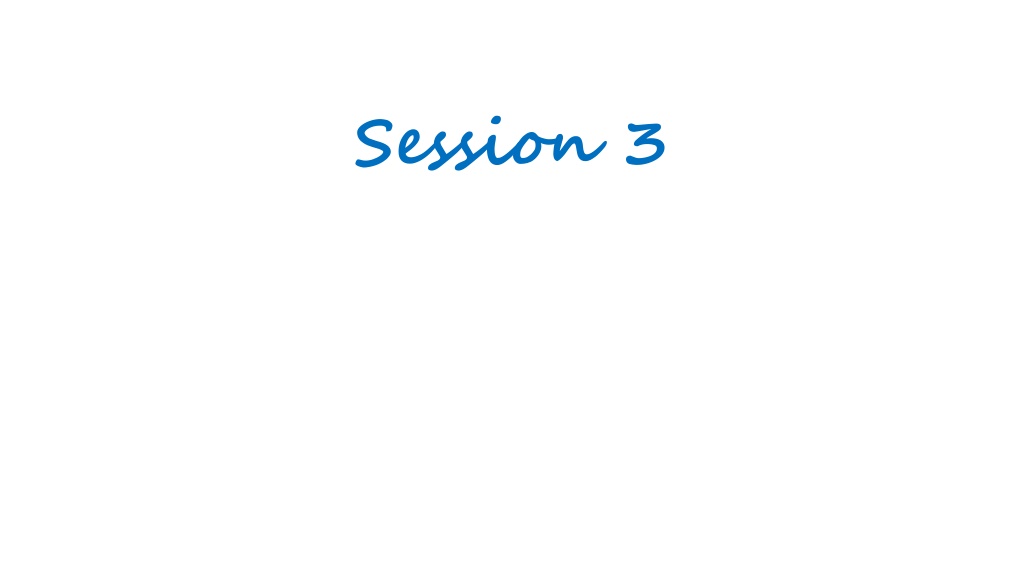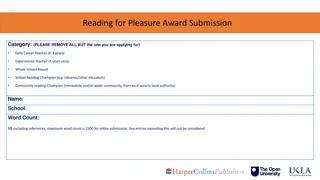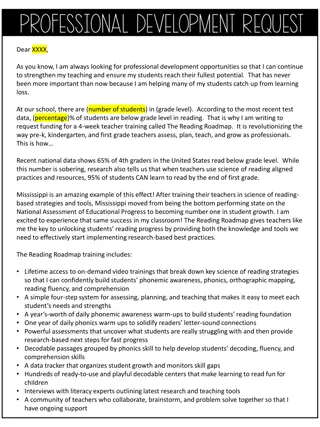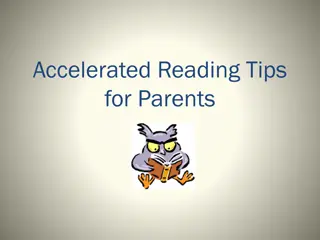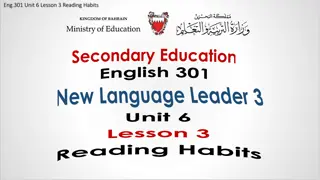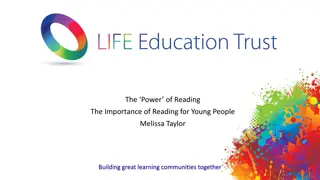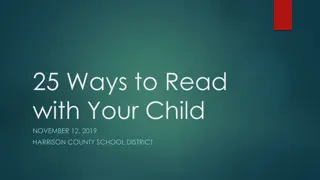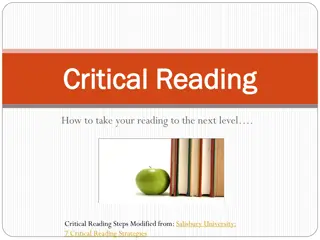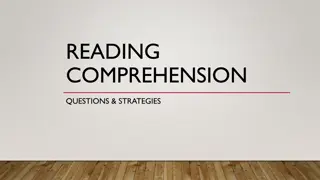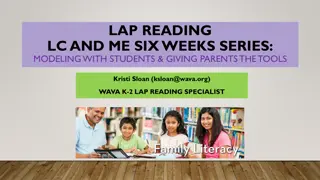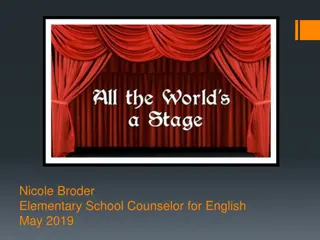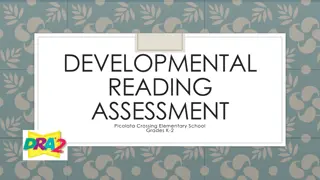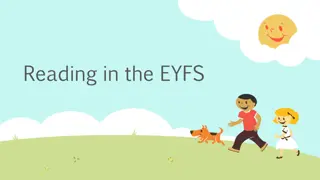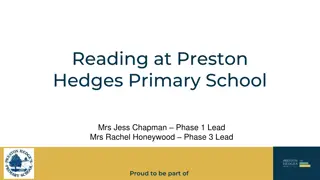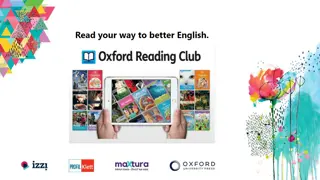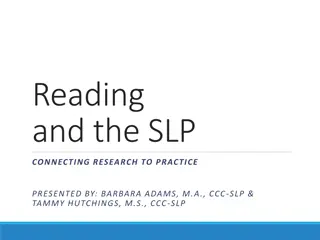Dietary Choices in America
Americans have diverse dietary preferences, from organic and vegetarian to vegan and gluten-free options. This guide explains the principles behind these choices and provides tips for understanding and navigating the American diet landscape. Explore the impact of food choices on health, the environment, and ethical beliefs while learning about different food categories such as organic, vegetarian, vegan, local, low-fat, and gluten-free.
Download Presentation

Please find below an Image/Link to download the presentation.
The content on the website is provided AS IS for your information and personal use only. It may not be sold, licensed, or shared on other websites without obtaining consent from the author.If you encounter any issues during the download, it is possible that the publisher has removed the file from their server.
You are allowed to download the files provided on this website for personal or commercial use, subject to the condition that they are used lawfully. All files are the property of their respective owners.
The content on the website is provided AS IS for your information and personal use only. It may not be sold, licensed, or shared on other websites without obtaining consent from the author.
E N D
Presentation Transcript
Unit 5 We Are What We Eat
Vocabulary Review Read the letter. Use the words from the box to fill in the blanks. Not all of the words will be used. approve complex diet environment grains insects population weeds Dear Mrs. Greiber, I have a small farm in Philadelphia. Just like City Farm, I grow organic produce. Many of my customers follow a natural (1) _______________. My farm has many problems. It is a(n) (2) _____________ situation. Maybe you can help. The first problem is that a lot of (3) ______________ eat my plants. What can I do? The second problem is the garden is full of (4) ______________ in the summertime. Can you suggest something to kill them that isn t bad for the (5) _______________? Would you (6) _____________ of something strong but still organic? I need your help! Thank you! Joanna Walton Philadelphia
TRAVELLING TIPS FOR YOU Making Sense of the American Diet 1. Hamburgers and French fries are known all over the world as typical American food. But when you travel in the United States, you will see that Americans choose many different kinds of diets. As a matter of fact, many Americans spend a lot of time thinking very hard about how and what they eat. They think that the traditional American diet is bad for their health and bad for the environment. As a result, you will see many labels and descriptions of food that might seems confusing. Here is a short guide to help you understand some of the choices: 2. ORGANICfood are grown with no pesticides or herbicides. There are also no GMOs in organic food. People who choose organic foods think that they are better for their health and for the environment. 3. VEGETARIANfood contains no meat. People choose a vegetarian diet for a number of reasons. Some believe that eating meat is not good for their health. Others have environmental reasons. They believe eating plants is better for the environment. Cows and other meat animals at the top of the food chain need lots of food, water, and energy. Carrots, beans, and potatoes, on the lower end of the food chain, need much less. Still others believe that people should not eat animals for ethical reasons. They believe that humans should not kill animals for any reason. 4. VEGAN food contain nothing at all from animals: no meat, no milk, no eggs, no honey, and no butter, for example. Reasons for eating a vegan diet are very similar to reasons for eating a vegetarian diet. But vegan eaters don t think that humans should use animals for food at all. 5. LOCAL food is grown less than 100 miles from you. Local food is usually very fresh. And buying it helps nearby farms and other businesses. People who eat local food also care about the environment. They don t want to eat food that must travel far by trucks, boats, and planes because it uses too much gasoline. This causes more pollution. 6. LOW-FAT foods have very little (for example, butter or oil) in them. People who are trying to lose weight, or people who have heart disease often eat low-fat diets. Many Americans have heart disease or are overweight, so low-fat diets and foods are very common in the U.S. 7. GLUTEN-FREE foods contain no gluten. Gluten is in wheat and many other grains. People with a gluten-free diet are usually allergic to gluten. They might get very bad stomachaches if they eat this. 1. Someone who doesn t want to eat animal, but who likes milk, eats _____. a. organic food 2. Someone who doesn t want to eat animals or anything made by animals eats _____. b. vegetarian food 3. Someone who wants to lose weight eats _____. c. vegan food 4. Someone who doesn t want to eat GMOs and pesticides eats _____. d. local food 5. Someone who want to supports farmers in nearby areas eats _____. e. low-fat food 6. Someone who is allergic to wheat eats _____. f. gluten-free food
FURTHER READING 1 1. The text suggests that teenagers _________ A. are healthier than their parents were. B. don t have enough information about healthy eating and lifestyle. C. sleep more than is needed. D. do more sports in schools than before. 2. According to the text, teens who go on a diet cut down on _ A. vegetables. B. bread and milk. C. chips. D. meat. 3. Most teens in the developed world _________ A. eat too much but are not eating healthy food. B. eat properly and stay healthy. C. eat less and grow and stay healthy. D. eat a lot of vegetables and healthy food. 4. Schools put pressure on students to _________ A. do well in sports. B. improve their physical condition. C. do well in course exams. D. take a bus instead of walking or cycling to school. 5. According to the text, many secondary school students on school nights _________ A. sleep at least 9 hours. B. feel angry or depressed. C. play computer games. D. go to bed after 11 p.m. 6. According to the text, some schools in the USA have changed the starting time of lessons because _________ A. they wanted to please their students. B. they wanted to improve students performance. C. parents insisted on changing the time. D. teachers complained about how unmotivated the students were. HEALTHY LIVING FOR TEENAGERS Food In a recent government survey on healthy eating teens scored only 5 out of 10 (8 indicated a healthy diet and 6 a passable one). Only 1 in 10 teens eats the recommended amount of fruit and the only vegetable that many teens eat is chips . Most teens in the developed world are eating too much but are still not getting the vital nutrients to help them grow and stay healthy. More information about nutrition and healthy eating is needed to help young people eat properly. Teens who diet often cut out food they need, such as bread or milk, because they think it is fattening. Others don t know what foods to choose in the school canteen in order to have a balanced diet. There is a saying you are what you eat . So if you want to become the next David Beckham then you d better start eating properly. Exercise Lack of money in schools plus increased pressure to do well in the course exams means that teenagers are doing less sport in school than ever before. Girls, in particular, are more likely to suffer from lack of exercise and up to 4 in 10 girls stop playing sports in their early teenage years. Jost because you aren t sporty doesn t mean you can t be active. Walk or cycle to school instead of taking the bus. Help at home with the housework or gardening. Go dancing with your friends. There are lots of ways you can stop being a couch potato! Sleep If we are what we eat then sleep is like food for the brain. Teens need at least 9 hours sleep every night and even mild sleepiness can affect your performance, humour and health. Lack of sleep can make you tired, angry or depressed. Nearly 40% of secondary school students go to bed after 11 p.m. on school nights and 15% of teens say they have fallen asleep during class. In the USA some schools are starting classes at 10 a.m. so that teens can get some extra sleep. These schools have noticed an improvement in their students work. .
FURTHER READING 2 1.The last time I went to a restaurant was about 2 months ago. My wife and I wanted to celebrate our wedding anniversary with a good meal so we went to an expensive Italian restaurant in downtown Lisbon. We both had pasta to start and for the main course my wife ordered a steak and I chose fish. For dessert we both ate chocolate cake topped with fresh cream. Delicious! 2. I went to a restaurant yesterday evening with my sister's children. It wasn't very expensive and the menu was very limited. We all had a burger and French fries, and drank cola. It wasn't very good. 3. My boyfriend loves spicy food so this restaurant was perfect. The waiters were all really friendly and polite, and they played traditional sitar music which was very relaxing. The menu offered vegetarian dishes as well as meat dishes served with rice and a sauce - it depended on how hot you wanted it! I chose a mild beef curry but my boyfriend had a lamb 'vindaloo' - he also drank 2 liters of water!! 4. My class at the university went there last weekend. It's a very popular type of restaurant in my country. It generally offers one type of food (a kind of bread with cheese and tomato sauce) which you then choose what ingredients to add on top of it. I asked for olives and mushrooms on mine and my classmates each had something different so we could taste a piece of each person's meal. 1. In which text did the person go there for a special occasion? 2. In which text did the person visit an Indian restaurant 3. In which text did the person eat pizza? 4. In which text did the person eat fast food? 5. In which text did someone eat seafood? 6. In which text did the person talk about the atmosphere of the restaurant? 7. Which restaurant was cheap? 8. In which text didn't the person enjoy their meal? 9. In which text did someone eat a very hot dish? 10. In which text did the person have a vegetarian meal?
ANSWER: 1. P1 2. P3 3. P4 4. P2 5. P1 6. P3 7. P2 8. P2 9. P3 10. P4
FURTHER READING 3 Tennis started in France nearly 1000 years ago. The game was originally played in the courtyards of royal palaces, using the walls (like squash) rather than a net. One of the Grand Slam tournaments takes place in Wimbledon every year. The Tournament or The Fortnight, as the British call the Wimbledon Tennis Championships, is very important to the English. So here you are, standing in the queue to buy your ticket to watch the matches. Everybody is waiting for their turn to get inside. Nobody is pushing. If you are English, you will have all the necessary things with you: a thermos of tea (of course), a folding chair and (surprise, surprise) an umbrella! At last you go through the gates, and you discover the atmosphere. People are sitting under their umbrellas enjoying the British weather. The atmosphere is calm and controlled. You feel as if you are in a select private club - and, in fact, you are. The gardens are superb (well, you are in England...). Every year 3,500 geraniums are planted! What is so special about Wimbledon? Well, it is the oldest tournament in the world, and the last of the big four championships to be played on natural grass. The American, Australian and French Championships are played on cement, artificial grass and clay. All the players must dress only in white. Wimbledon is free from sponsorship, which makes it different from almost all other sporting events. This means that there are no advertising banners around the courts. The people who come to watch the matches, compared to those who watch many other international tournaments, are well disciplined. You can only sometimes hear shouts or whistles when a player prepares to serve. And if any spectator behaves badly, he or she may be asked to leave. You think that the English are very serious tennis fans. But if you want a good place, you may well find one around 4 p.m. Where has everybody gone? Look in the tents: they are having strawberries and tea. After all, tennis is just one of many traditions, and the English like to continue them all - especially tea! 1. The Fortnight is ________ A. another name for the Grand Slam tournaments. B. the original name for a game similar to squash. C. the name of one of the two Wimbledon tournaments. D. another name for the Wimbledon Championships. 2. To enter Wimbledon you have to ________ A. wait in a line of people. B. book the tickets earlier. C. have your own chair. D. belong to the club. 3. Which of these sentences is true? A. Most of the courts at Wimbledon have artificial grass. B. Only the Wimbledon tournament is played on natural grass. C. The Wimbledon championships are played on cement or clay. D. All four Grand Slam Tournaments are played on natural grass. 4. Spectators at Wimbledon ________ A. never behave badly during a match. B. leave when a player serves badly. C. do not often shout during a match. D. are given special discipline rules. 5. It is easier to find a seat at 4 o clock because ________ A. English spectators go to some special tents. B. it is an English tradition to go home for tea. C. most of the spectators leave Wimbledon. D. serious tennis fans come in the morning. 6. The text is mainly about ________ A. the most popular sports in England. B. the history of tennis championships. C. the tennis tournaments at Wimbledon. D. different English customs and traditions.
FURTHER READING 3 Tennis started in France nearly 1000 years ago. The game was originally played in the courtyards of royal palaces, using the walls (like squash) rather than a net. One of the Grand Slam tournaments takes place in Wimbledon every year. The Tournament or The Fortnight, as the British call the Wimbledon Tennis Championships, is very important to the English. So here you are, standing in the queue to buy your ticket to watch the matches. Everybody is waiting for their turn to get inside. Nobody is pushing. If you are English, you will have all the necessary things with you: a thermos of tea (of course), a folding chair and (surprise, surprise) an umbrella! At last you go through the gates, and you discover the atmosphere. People are sitting under their umbrellas enjoying the British weather. The atmosphere is calm and controlled. You feel as if you are in a select private club - and, in fact, you are. The gardens are superb (well, you are in England...). Every year 3,500 geraniums are planted! What is so special about Wimbledon? Well, it is the oldest tournament in the world, and the last of the big four championships to be played on natural grass. The American, Australian and French Championships are played on cement, artificial grass and clay. All the players must dress only in white. Wimbledon is free from sponsorship, which makes it different from almost all other sporting events. This means that there are no advertising banners around the courts. The people who come to watch the matches, compared to those who watch many other international tournaments, are well disciplined. You can only sometimes hear shouts or whistles when a player prepares to serve. And if any spectator behaves badly, he or she may be asked to leave. You think that the English are very serious tennis fans. But if you want a good place, you may well find one around 4 p.m. Where has everybody gone? Look in the tents: they are having strawberries and tea. After all, tennis is just one of many traditions, and the English like to continue them all - especially tea! 1. The Fortnight is ________ A. another name for the Grand Slam tournaments. B. the original name for a game similar to squash. C. the name of one of the two Wimbledon tournaments. D. another name for the Wimbledon Championships. 2. To enter Wimbledon you have to ________ A. wait in a line of people. C. have your own chair. D. belong to the club. 3. Which of these sentences is true? A. Most of the courts at Wimbledon have artificial grass. B. Only the Wimbledon tournament is played on natural grass. C. The Wimbledon championships are played on cement or clay. D. All four Grand Slam Tournaments are played on natural grass. 4. Spectators at Wimbledon ________ A. never behave badly during a match. B. leave when a player serves badly. C. do not often shout during a match. D. are given special discipline rules. 5. It is easier to find a seat at 4 o clock because ________ A. English spectators go to some special tents. B. it is an English tradition to go home for tea. C. most of the spectators leave Wimbledon. D. serious tennis fans come in the morning. 6. The text is mainly about ________ A. the most popular sports in England. B. the history of tennis championships. C. the tennis tournaments at Wimbledon. D. different English customs and traditions. B. book the tickets earlier.
1. Nowadays there are a lot of language schools ________ A. in big cities in Poland. B.in big and small cities in Poland. C. in countries other than Poland. D. all over Europe. 2. The school is accredited if ________ A. it is not on the British Council list. B. it is checked by experts. C. its teachers have contact with the British Council. D. its teachers are trained by the British Council. 3. Before choosing a school you should ________ A. talk to the school manager. B. talk to the teachers. C. talk to people who study there. D. discuss your choice with your family. 4. Before choosing a school you should ________ A. go to an English speaking country. B. have private lessons first. C. decide what you want to study English for. D. pass an exam 5. While visiting a school you should pay attention to _______ A. other students. B. equipment. C. furniture. D. how you feel about the school. 6. While visiting a school you may ________ A. check if the teachers have proper qualifications. B. check if the teachers have proper qualifications and watch a class. C. watch a class. D. check what textbook is used. FURTHER READING 4- CHOOSING A LANGUAGE SCHOOL Today, there are language schools on practically every street (well, it seems like that sometimes, especially in the bigger cities here in Vietnam). How do you decide which school is right for you? Here are a few things to think about when you are looking through flyers, leaflets and brochures from different schools. Before you visit a school: If you are going to study English in the UK, contact the British Council to see which schools are accredited by them. If a school is accredited, it means that their inspectors regularly check it to make sure that it is good enough. If a school isn t good enough, it loses its accreditation. So, if you choose an accredited school, you will probably be happy with it. Talk to people you know who are doing language courses at different schools. What do they think about the schools and courses? If you choose the same school or same course as them, you may have the same opinions later, Ask yourself what you want to learn English for. Do you have any specific goals, like passing an exam or going to work in an English speaking country? If you have, make a list of them. Think about whether it would be better for you to have private lessons with a teacher or lessons in a group. Then look at the courses that local schools are offering to see what might be right for you. While you re visiting a school: Take a look around the building. Does it look tidy? Does it look well- organised? Do you feel comfortable in it? Ask about the teachers that work at the school. Remember, you have a right to see copies of their qualifications. Ask about whether you can watch a class for free before signing up for a course. A good school will be happy to arrange this for you. Found a good place? Great! Now go away and study!
FURTHER READING 4- CHOOSING A LANGUAGE SCHOOL Today, there are language schools on practically every street (well, it seems like that sometimes, especially in the bigger cities here in Viet- nam). How do you decide which school is right for you? Here are a few things to think about when you are looking through flyers, leaflets and brochures from different schools. Before you visit a school: If you are going to study English in the UK, contact the British Council to see which schools are accredited by them. If a school is accredited, it means that their inspectors regularly check it to make sure that it is good enough. If a school isn t good enough, it loses its accreditation. So, if you choose an accredited school, you will probably be happy with it. Talk to people you know who are doing language courses at different schools. What do they think about the schools and courses? If you choose the same school or same course as them, you may have the same opinions later, Ask yourself what you want to learn English for. Do you have any specific goals, like passing an exam or going to work in an English - speaking country? If you have, make a list of them. Think about whether it would be better for you to have private lessons with a teacher or lessons in a group. Then look at the courses that local schools are offering to see what might be right for you. While you re visiting a school: Take a look around the building. Does it look tidy? Does it look well- organised? Do you feel comfortable in it? Ask about the teachers that work at the school. Remember, you have a right to see copies of their qualifications. Ask about whether you can watch a class for free before signing up for a course. A good school will be happy to arrange this for you. Found a good place? Great! Now go away and study! 1. Nowadays there are a lot of language schools ________ A. in big cities in Poland. B.in big and small cities in Poland. C. in countries other than Poland. D. all over Europe. 2. The school is accredited if ________ A. it is not on the British Council list. B. it is checked by experts. C. its teachers have contact with the British Council. D. its teachers are trained by the British Council. 3. Before choosing a school you should ________ A. talk to the school manager. B. talk to the teachers. C. talk to people who study there. D. discuss your choice with your family. 4. Before choosing a school you should ________ A. go to an English speaking country. B. have private lessons first. C. decide what you want to study English for. D. pass an exam 5. While visiting a school you should pay attention to _______ A. other students. B. equipment. C. furniture. D. how you feel about the school. 6. While visiting a school you may ________ A. check if the teachers have proper qualifications. B. check if the teachers have proper qualifications and watch a class. C. watch a class. D. check what textbook is used.
Thank You forYourAttention!
